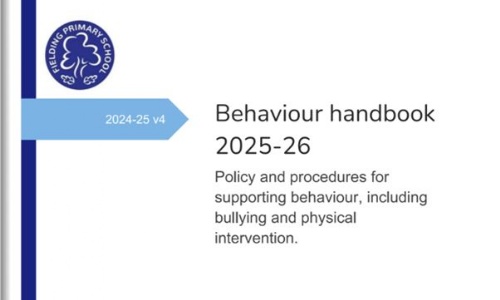Teaching children to be the best version of themselves, every choice matters

At Fielding Primary School, we believe that every behaviour, positive or negative, has a consequence. Our updated Behaviour Handbook for 2025–26 outlines a clear, consistent, and values-based approach to support pupils to be the best version of themselves across all areas of school life.
Why This Matters
Creating a safe, respectful, and inclusive environment is essential for learning and wellbeing. Our behaviour policy is built on our core values: respect, responsibility, reflection, and empathy. These values guide every interaction and decision, helping pupils understand the impact of their choices.
Key Messages for Parents
- All behaviour has a consequence: Positive behaviour is recognised and rewarded, while unsafe or unacceptable behaviour is addressed with appropriate sanctions.
- Positive choices are celebrated: Pupils earn daily blue tokens for demonstrating good behaviour and self-regulation. These contribute to constellation rewards, certificates, and recognition in assemblies.
- Clear expectations: Pupils are taught and reminded of our Golden Rules, which are adapted for different age groups and linked to our values.
- Support for emotional regulation: Tools like the Zones of Regulation, MindUP, and emotional coaching scripts help pupils manage their feelings and make better choices.
- Restorative practice: When things go wrong, we focus on reflection and repair. Pupils may complete a Think Sheet, lose break time, or take part in restorative conversations.
- Transparency and communication: Behaviour incidents and rewards are logged on Bromcom, visible to parents via the MCAS app. Staff will contact parents directly if concerns arise.
The Role of Parents and Carers
Promoting positive behaviour is most effective when school and home work together. We ask all parents and carers to:
- Check the MCAS app daily: This is the primary way we share behaviour updates, rewards, and any concerns. Regular checking helps you stay informed and respond promptly if needed.
- Reinforce school values at home: Talk about respect, empathy, responsibility, and reflection in everyday situations.
- Support emotional regulation: Encourage your child to use strategies like deep breathing, naming emotions, or taking a break when needed.
- Communicate with us: Let us know about any changes at home that might affect your child’s behaviour or wellbeing. If you have concerns, speak to your child’s class teacher in the first instance.
- Celebrate progress: Acknowledge and praise your child’s efforts to make good choices, even when things are challenging.
Together, we can help every child feel safe, valued, and ready to learn. Thank you for your support.
Clare Haines
